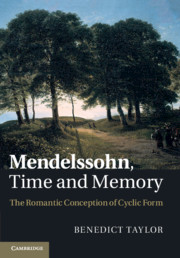1 - The idea of cyclic form
Published online by Cambridge University Press: 05 November 2011
Summary
The very term ‘cyclic form’ is confusing. Hans Keller was exaggerating only a little when he described it as ‘one of the most senseless technical terms in the rich history of musicological nonsense’. In fact, it is almost obligatory for commentators to offer some brief apology for their continued use of the term. Charles Rosen, for instance, states that ‘“cyclical form” is an ambiguous as well as a vague term’, whilst James Webster, in his influential study of Haydn's ‘Farewell’ Symphony, prefaces his text with a disclaimer on the unsuitability of the terms ‘cyclic’ and ‘through-composed’, before going on to use them nevertheless.
The term ‘cyclic’, as applied to music since c. 1750, can be used to describe:
a work where part of one movement is recalled in another (examples include Haydn's Symphony No. 46, Beethoven's Fifth and Ninth Symphonies, Mendelssohn's Octet, Schubert's E♭ Trio, Schumann's Piano Quintet, and later pieces by Franck, Brahms, Dvořák, Elgar and Mahler);
a work where separate movements are based on similar thematic material, often accompanied by the merging of individual movements (examples include Schubert's ‘Wanderer’ Fantasy, Mendelssohn's Third and Schumann's Fourth Symphonies, Liszt's B minor Sonata, and numerous works of Franck);
a collection of miniatures, which make full sense only when considered as a whole (archetypically the Romantic song-cycle, but also including piano collections such as Schumann's Carnaval or Davidsbündlertänze).
Information
- Type
- Chapter
- Information
- Mendelssohn, Time and MemoryThe Romantic Conception of Cyclic Form, pp. 6 - 51Publisher: Cambridge University PressPrint publication year: 2011
